Matt Farwell, Michael Ames, American Cipher: Bowe Bergdahl and the US Tragedy in Afghanistan, Penguin, 2019.
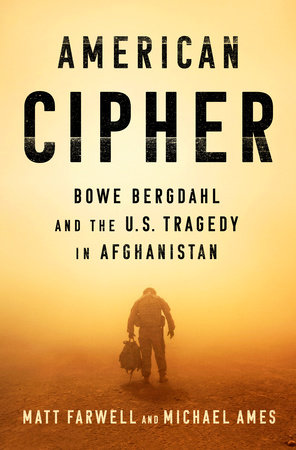
Bergdahl captured the American imagination in 2009 when he disappeared from what had become his living hell.
His battalion commander, Lt Baker, was not only an obnoxious tyrant (handing out Field-Grade Article 15s, just short of a court martial, supposedly for being out of uniform, but in fact for complaining about the mission to a Guardian photo-journalist in a video broadcast), but he had ordered them to build the OB (observation post) Mest on a cemetery, defiling, even defecating on gravestones near the FOB (forward operating base) Sharana.
He was as much a victim of the latest American COIN (counterintelligence) strategy as a deserter. Taken captive by the enemy (Taliban) under the protection of an ally (Pakistan), embodying the self-enforcing illogic of the entire war.
The FOB’s OP (army talk is littered with acronyms and abbreviations, quickly reducing any text or conversation to gobbledygook) would transfer authority to Afghan troops operate under US troops, the idea being to eventually leave the Afghans in sole charge.
They would establish security, identify the Taliban, separate them from the local population, show the villagers they were better off with Karzai and the Americans in charge. Abracadabra. The Taliban would just disappear, as they very well ought to.
But it’s not the Taliban who have disappeared. Between 2006 and 2014, 20,000 soldiers have deserted from Iraq and Afghanistan.
Since 2001 the army pressed charges against less than 2,000, half pleaded guilty, 78 were tried and convicted. That pales in comparison to more than half a million Vietnam draft resisters/ deserters from 1966 to 1973. Desertion is as American as apple pie.
Bergdahl’s 4 weeks of hell sent him over the edge. He forgot the most important rule about the army. Don’t think. Just obey orders. Your superior is always right. It’s not clear what exactly B decided he was going to do, but he snuck away in the night, careful not to be noticed and headed for … hmmm. I guess he hadn’t really decided anything other than giving himself over to the Taliban, which was pretty easy.
Hours after dawn, the word got out and Taliban equivalent of UPS picked up their load and whisked him across the border into FATA (federal administrative tribal areas) in Pakistan, just out of reach of the US army.*
Domino or butterfly effect?
His desertion (he eventually ignored his defence lawyer and pleaded guilty) set in motion a domino effect on a massive scale, but not the one the prosecution tried to pin on him: that B’s desertion led to soldiers’ deaths. The early angry accusations soon melted under examination, leaving B’s actions as a butterfly effect in a chaotic world.
Even his hated superior Baker later admitted that DUSTWUN (missing soldier alert), while difficult, had also produced some of the greatest disruptions of Taliban networks that he had seen at any point during the war. Commanders in the field used the search for Bergdahl as a justification for more aggressive tactics to achieve stability in the area.
It was a great way to motivate troops — rescuing a soldier was more ‘fun’ that just terrorizing hostile Afghans. It was a real mission, not the phony one they would be doing otherwise. “Everyone knew it was going on.”
Baker sounds like a real SOB (making all the troops shave 6 times in a row because one missed a stray hair, screaming two inches from their faces). Insisting the OB be built on a cemetery and desecrating graves set off an alarm in B’s mind. Afghan soldiers were known to turn their guns on their American comrades for less. But, what the hell, Whiskey Tango Foxtrot,** Afghanistan is FUBAR.***
In American Cipher, Farwell and Ames don’t need any purple prose. Hard facts do the trick. For instance, in 2007 a soldier in B’s 2nd Platoon, Blackfoot Company, 1/501, Evan Vela, killed an unarmed captive Iraqi on orders from his superior, staff sergeant Hensley. He was court-martialed and sentenced to 10 years. Rather than murder, Henley was acquitted, charged only with a minor infraction.
It would be hard to beat Sergeant Robert Bales who slipped off base in Kandahar twice in one night in 2012 and shot 16 civilians in their homes in front of their families. At least he got life. It’s a miracle that B’s handlers didn’t string him up in response when they heard of this.
B enlists in 2008 and he is deployed in May 2009. At the end of training (Fort Richardson, Alaska), Command Sergeant Major Wolfe told them: I know you all joined because you want to rape, pillage and kill. That’s why I joined. But you need to think about COIN, winning over local farmers, merchants, drivers.
The training screams of cognitive dissonance. During training, they would chant ‘trained to kill, kill we will.’ Sex assaults and rapes were rampant at Fort Richardson.
FOB Sharana was built on a Soviet base. A/c barracks, dvd players, internet, lots of video games, hot showers, porcelain toilets, a basketball court, coffee shops, as much food as they wanted any time. But a strict dress code and shaving regime. Logistics brought in steak and lobster dinners for officers.
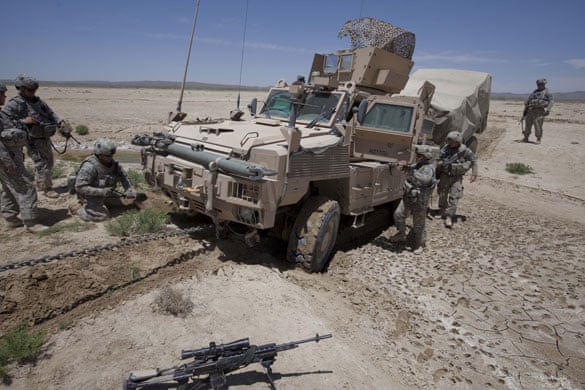
B’s one mission was in an MRAP (mine-resistant ambush-protected) armored vehicle, sent to retrieve an EOD (explosive ordnance disposal) team’s truck but the mountain road was too narrow, they hit an IED (improvised explosive device), another vehicle was disabled, they came under Taliban fire, and were saved by air support.
What should have been a few hours to retrieve a damaged truck had become a week-long ordeal. And to top it off, Baker glared at them when they returned. “What, you couldn’t shave?”
B’s instincts were right. He and his only real friend, Joseph Coe ate dinner with the Afghan soldiers up the hill most evenings. Coe grew up in a missionary family in the highlands of Venezuela, and refused to be party to Bergdahl’s later vilification by his fellow soldiers.
B and Coe realized befriending the Afghans was the right thing to do, and a commonsense precaution against ‘green on blue’ (Afghan soldier/ police killing Americans).
The Afghan soldiers were friendly and welcomed them. The soldiers never learned their names, nicknaming them ‘ice cream’, ‘crazy eyes’. They called their translators John or Jack.
Bergdahl respected the Afghans, realized the occupiers had to respect their culture, i.e., the cemetery. Eating with the Afghans was like having a meal with his neighbours on the prairies in Idaho, Peruvian Quechua shepherds. He didn’t want to die fighting them, when he knew they were in the right.
“These people need help, yet what they get is the most conceited country in the world telling them that they are nothing and that they are stupid, that they have no idea how to live.”
What he was supposed to do for the next two years had nothing to do with helping them. So he put his fate in their hands. He knew he would survive. His rash, quixotic decision became an important symbolic gesture pointing to the way out of this latest imperial deadend.
Behind the scenes, there are human terrain teams (anthropologists), provincial reconstruction teams (a hydra of military, state department and USAID NGOs), tactical human intelligence teams (liquor and porn as bribes). The disconnect with the ‘kill we will’ foot soldiers, the face of the occupiers to most Afghan, makes their existence meaningless.
B lasted a month before he wrote a scathing email to his folks:
We don’t even care when we hear each other talk about running their children down in the dirt streets with our armored trucks… We make fun of them in front of their faces, and laugh at them for not understanding we are insulting them […] I am sorry for everything. The horror that is America is disgusting.
Then left his weapon and night vision goggles on his neatly made cot, and fled to the arms of the Taliban.
Peace on Earth
B’s captors immediately offered a deal: 25 Taliban prisoners and $9m. The offer was rejected without any attempt to negotiate. The Taliban continued to offer a deal but the mantra from Bush and Obama was ‘we don’t negotiate with terrorists.’
There were over 100 kidnappings from 2001–11, mostly journalists and missionaries. All were released with a quiet negotiations and a ransom. B was a test case for both sides, as a prisoner exchange would give the Taliban de facto recognition. It wasn’t the puppet Karzai/ Ghani but the US president negotiating with the Taliban.
The authors dismiss the possibility that Bergdahl might have converted to Islam, that his anti-imperialist lecture, delivered on Christmas day 2009 courtesy of his captors and social media, was surely just a forced confession, though it was quite articulate, not “absurd”, as Farwell and Ames state.
He mentions the indignities suffered by Muslim prisoners in Bagram, Guantanamo, Abu Ghraib and other secret prisons around the world, “but the Taliban treated me as human being with dignity. Aren’t our leaders simply the puppets of the lobbies that pay for their election campaigns?”
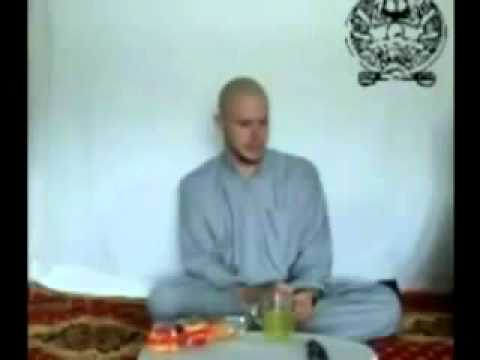
He (or rather his Taliban minders) refer to Veterans for Peace activist and ex-Marine Matthew Hoh, who resigned from his foreign service posting in Kabul interview, and in an interview with CNN‘s Wolf Blitzer in November 2009 read from his resignation letter: American combat troops are not defeating al-qaeda by their presence in Afghanistan. All they are doing is just fighting people who are fighting us because we’re occupying them.
B’s testimony “grows more dogmatic–and more absurd.” Come on! Give the Taliban at least an A for crafting a coherent agitprop video showing MRAPs, dead ISAF soldiers, a video of an improvised IED. Ok, “We have forced them to strap large amounts of explosives to their precious bodies, to leave their homes and children to kill us.” — is a bit over the top. But it’s a lot closer to the truth than the US version of events.
A few days after B’s bombshell, CIA agent Hamam al-Balawi blew himself and his US minders up at the CIA base in nearby Khost, leaving behind his martyr video. Both Bs were under the direction of the Haqqani network,**** with the knowledge (and help) of Pakistan’s ISI (Inter-services Intelligence). For newly arrived Major General Michael Flynn, director of intelligence for NATO’s ISAF coalition, not a Christmas to remember.
B became a lightning rod for the increasing frustration over this unending war. Fox news interviewed spy novelist and retired lt col Ralph Peters:
This private is a liar. We’re not sure if he’s a deserter. Collaborating with the enemy. The Taliban can save us a lot of legal hassles and legal bills.
Whew! Carte blanche to slice B’s head off. The interview was censored, but only for fear it served the Taliban. Flynn called him a jihadi. 23 veteran Congressmen published an open letter reminding McCain and others that they made statements contrary to their beliefs to stay alive.
B’s mother: the Taliban was now a part of our family
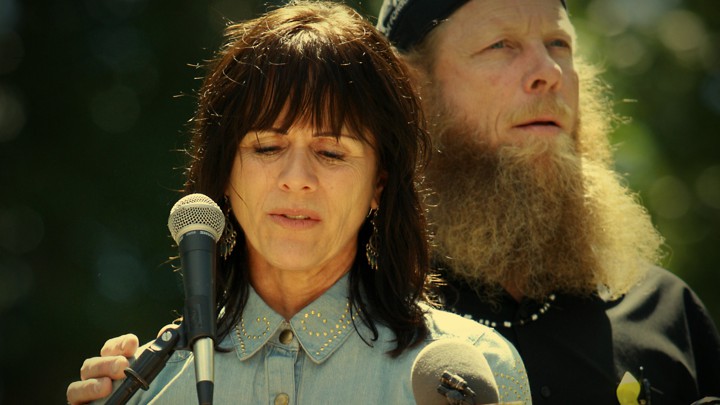
After years of stonewalling, B’s father Bob realized the government was incapable of diplomacy and he decided to go to Pakistan to give himself in exchange for his son. He used twitter, quoting from the Koran, with a message of radical peace.
He travelled to visit a mosque in Washington, where the imam taught him to pray. He wore a kufi and grew his beard, knowing that the Taliban would see him on social media, trying to appeal to the Pashtun values and customs. B’s mother Jani told him, “the Taliban was now a part of our family.”
He talked with his pastor about overlaps between Calvinism and Islam. He realized peace would only come by understanding the men who held his son. Without peace, his son would never come home. The Bergdahls respected, embraced the enemy. The Christological overtones are everywhere. B’s 40 days in the wilderness, suffering for our sins, resurrection from the dead, love thine enemy …
For Bob and Jani, their prayers were answered. Obama had to wrap this up, and though he should have got Congressional approval, he just quietly released ‘the Taliban 5’ to Qatar and sent a SEAL rescue team to scoop up B, filmed by his captors for the world to see. Obama “broke the law by not informing Congress,” fumed Republican House Armed Services Committee Congressman Howard “Buck” McKeon.
Obama was getting his own back. He had vowed in 2009 that he would close Guantanamo and had been shafted. Convincing him was Holbrooke’s adviser Barney Rubin who reminded Obama that of the 5 Taliban, 3 had surrendered, 2 were detained after they showed up for appointments saying they wanted to help us.
Vietnam
No doubt others who were traumatized by the war in Afghanistan will find healing as have the Bergdahls, by acknowledging the guilt of being part of this invasion and destruction of a country and its people. This happened — is still happening — after the liberation of Vietnam.
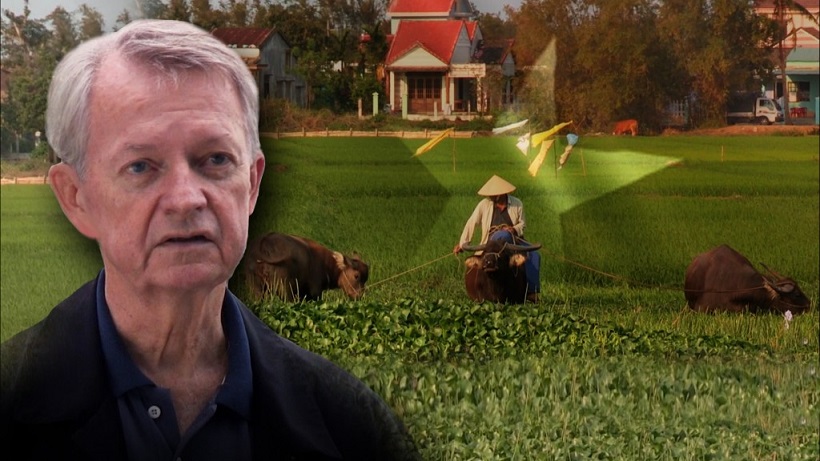
One of many Vietnam vets who have returned to Vietnam looking for closure, Chuck Searcy moved to Vietnam in 1995 as representative of the Vietnam Veterans Memorial Fund, and helped launch Project RENEW in Quang Tri Province, to clean up UXO (unexploded ordnance) and provide medical assistance, rehabilitation, and income generation for UXO victims. Like Hoh, Searcy is active in Veterans For Peace, based in Vietnam.
In 2003 Searcy was awarded Vietnam’s National Friendship Medal.
Bergdahl hoped to cause an emergency, a Goliath moment which would give him the chance to bring his commanding officer Baker’s leadership failures to light, to steer the US intervention towards the truth. A DUSTWUN was the most powerful weapon B had.
The day after he shipped his things home, he sent an email from Sharana to a group of friends in Idaho quoting Atlas Shrugged‘s John Galt:
It is not the being of value who fails the system. It is the system that has failed the man. The system should be remade to fit the man who holds value as worth.
B aimed to bring the gears of system to a halt, his own personal (nonviolent) 9/11, and remake it.
It worked, sort of. When the dust finally settled, Bowe was handed a dishonorable discharge (instead of life), and a few pay deductions, but awarded two good conduct medals for service in captivity. Even Trump had stopped calling for his execution, and started negotiating with the Taliban, which is exactly what Bergdahl’s very brave, but also very risky, act was all about.
In a March 1, 2019 interview on C-Span, ex-Marine and foreign service official Matthew Hoh makes the point that the war actually began in 1973 with the overthrow of the king. He doesn’t make the point that the logical secular trajectory led to socialism, nor does he point to the US arming and supporting the Islamists as the real crime.
But Bergdahl’s trajectory is the logical one today — looking to the enemy for an answer. Whether or not Bowe took the shuhada and became a muslim, his reaching out to the Taliban and his father and mother’s realization that “the Taliban are part of our family,” says it all.
An earlier version of B’s monkey-wrench-into-the-killer-machine, during the Vietnam war, is Christopher Boyce, who worked for the National Reconnaissance Office in the 1970s, and discovered the CIA were deposing Prime Minister Gough Whitlam in Australia for wanting to close US military bases and withdraw Australian troops from Vietnam.
Boyce saw that the CIA was undermining not just Australia but other democratic, industrialized allies. Boyce figured the press was useless. The media’s earlier disclosure of CIA involvement in the 1973 Chilean coup d’état had not changed anything for the better.
If he was going to make a splash, he’d have to turn to the ‘enemy’. Then, it was the Soviet Union. Despite his solidly conservative upbringing, he, like B, came to realize that the ‘enemy’ was almost by definition the ‘good guy’. His crossing the line and spying for the Soviet Union was much like B’s — very risky, harrowing, to say the least, life-changing.
He spent 25 years in prison as penance, and now lives quietly in Oregon, not so far from the Bergdahls. Another gripping story of defying the empire and living to tell the tale.
Now if only Boyce’s wildly idealistic expose had saved Whitlam and brought down US imperialism back in the 1970s.
Or at least if we could rewind our tape to 1979, and see the Soviet Union and its attempt to shore up the faltering secular socialist government in Afghanistan, as “part of our family”, to be embraced, not vilified and destroyed. If only our present was the counterfactual history, not the peaceful, secular Afghanistan of yore.
Boyce and Bergdahl sensed who the real enemy is. They aimed for Goliath’s eye with their stone and hit it, but to no avail. Boyce’s logic pointed to socialism. Bergdahl’s saga points to Islam. The best thing in the 1970s was to make peace with the Soviet Union, not to destroy it. Now, it is for the US to embrace Islam’s message of peace. There Is No Alternative.
xxx
**There are at least four spying agencies all at cross-purposes. The oldest the army’s, which was supposed to close when the CIA was created but secretly kept working. Under the army was also a special unofficial service which carried out very secret things like Iran-contra.
Then there’s the FBI, responsible for any American in a non-combat country. Also the Drug Enforcement Agency (DEA). All had their claim to Bergdahl. The search for Bergdahl was as much a war between the CIA (secretly allowed to do things in Pakistan) against the army’s spymasters, the FBI and the DEA. The army ‘won’. Sort of.
**Army jargon for WTF (what the f&#k)
***‘Fucked Up Beyond All Repair’.
****Jalaluddin Haqqani, who visited the Reagan White House and was once described by Texas politician Charlie Wilson as “goodness personified”.
Canadian Eric Walberg is known worldwide as a journalist specializing in the Middle East, Central Asia and Russia. A graduate of University of Toronto and Cambridge in economics, he has been writing on East-West relations since the 1980s.
He has lived in both the Soviet Union and Russia, and then Uzbekistan, as a UN adviser, writer, translator and lecturer. Presently a writer for the foremost Cairo newspaper, Al Ahram, he is also a regular contributor to Counterpunch, Dissident Voice, Global Research, The 21st Century, Al-Jazeerah and Turkish Weekly, and is a commentator on Voice of the Cape radio.
The 21st Century
